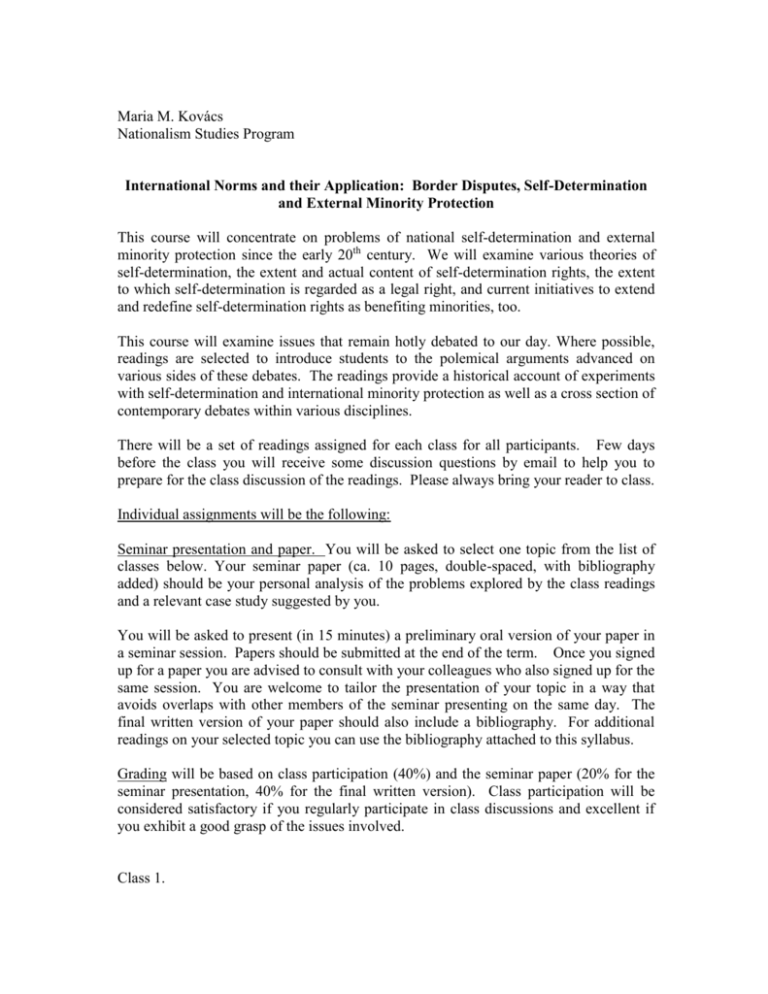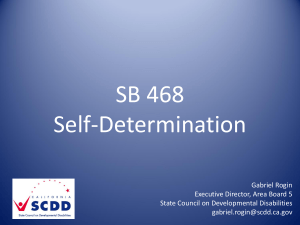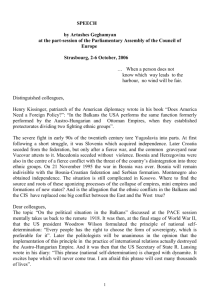Debates on Self-Determination and Minority Protection
advertisement

Maria M. Kovács Nationalism Studies Program International Norms and their Application: Border Disputes, Self-Determination and External Minority Protection This course will concentrate on problems of national self-determination and external minority protection since the early 20th century. We will examine various theories of self-determination, the extent and actual content of self-determination rights, the extent to which self-determination is regarded as a legal right, and current initiatives to extend and redefine self-determination rights as benefiting minorities, too. This course will examine issues that remain hotly debated to our day. Where possible, readings are selected to introduce students to the polemical arguments advanced on various sides of these debates. The readings provide a historical account of experiments with self-determination and international minority protection as well as a cross section of contemporary debates within various disciplines. There will be a set of readings assigned for each class for all participants. Few days before the class you will receive some discussion questions by email to help you to prepare for the class discussion of the readings. Please always bring your reader to class. Individual assignments will be the following: Seminar presentation and paper. You will be asked to select one topic from the list of classes below. Your seminar paper (ca. 10 pages, double-spaced, with bibliography added) should be your personal analysis of the problems explored by the class readings and a relevant case study suggested by you. You will be asked to present (in 15 minutes) a preliminary oral version of your paper in a seminar session. Papers should be submitted at the end of the term. Once you signed up for a paper you are advised to consult with your colleagues who also signed up for the same session. You are welcome to tailor the presentation of your topic in a way that avoids overlaps with other members of the seminar presenting on the same day. The final written version of your paper should also include a bibliography. For additional readings on your selected topic you can use the bibliography attached to this syllabus. Grading will be based on class participation (40%) and the seminar paper (20% for the seminar presentation, 40% for the final written version). Class participation will be considered satisfactory if you regularly participate in class discussions and excellent if you exhibit a good grasp of the issues involved. Class 1. Introduction The introductory class will outline the structure of the course and define the key terms under discussion. Class 2. Self-determination, the current debate 1 –44 The theoretical debate on self-determination was revived with the increase of claims to self-determination in post-Cold War Eastern Europe. The debate has been multi-faceted, including questions on conditions for legitimate self-determination claims, the tension between the claim to self-determination by a people and the territory associated therewith, as well as the issue of external and internal self-determination. The class will examine these debates in the context of recent developments. Required reading: Donald L. Horowitz, “The Cracked Foundations of the Rights to Secede,“ Journal of Democracy, Volume 14,Number 2 (April 2003), pp. 5-17. Hurst Hannum, “The Specter of Secession,” Foreign Affairs, Vol. 77, No. 2 (March/April 1998), pp. 13-18. T.M. Franck, "Postmodern tribalism and the right to secession" in Catherine Brölmann, René Lefeber and Marjoleine Zieck (Eds.), Peoples and Minorities in International Law, Martinus Nijhoff Publishers, Dodrecht/Boston/London, 1993. pp. 3-27. *Rosalyn Higgins, "Postmodern Tribalism and the right to secession, comments" op. cit. pp. 29-33. Documents: Response of the international community to the declarations of independence by Slovenia and Croatia Yugoslavia on the eve of its dissolution List of countries by date of independence Class 3. External minority protection, the current debate 45-88 The end of the Cold War ushered in an era of the emergence of new democratic institutions and debates on rights and protective mechanisms for citizens of the newly democratizing countries. At the same in many countries of Central and Eastern Europe nationalism also re-gained momentum among majorities as well as minorities. These developments sparked off a growing a debate on minority protection throughout the 1990s. The class will trace these debates, explore the emergence of recent attempts at external minority protection and link these to the debates on self-determination. Required reading: Adam Burgess, "National Minority Rights and the "Civilizing of Eastern Europe", Contention, Vol. 5., No. 2, Winter, 1996, pp. 17-35. Robert Musgrave, “The Protection of Minorities in Modern International Law”, in: Self –Determination and National Minorities, OUP, 2000, 126-147. Gwendolyn Sasse, “EU Conditionality and Minority Rights: Translating the Copenhagen Criteria into Policy, EUI, 2005/6, pp. 1-21 Class 4. Self-Determination and external minority protection in history: developments up to the Second World War 89 – 151 The origins of the concepts of national self-determination and minority rights are closely linked with the emergence of modern nationalism as a challenge to multinational states. The class will trace self-determination disputes and debates surrounding them during the first half of the 20th century and attempts at external minority protection, focusing in particular on the minority treaties established in Central and Eastern Europe after the First World War. Required reading: Antonio Cassese, Self-Determination of Peoples, a Legal Reappraisal, CUP, 1995, pp. 11-33. Inis L. Claude, National Minorities, an International Problem, HUP, Cambridge, 1955, pp. 7-50. Documents: President Woodrow Wilson’s Fourteen Points President Wilson’s Adress to Congress Peace Treaty with Austria National Minorities in the East European States, 1919-1938 The Polish Minority Treaty Recommended reading: Michla Pomerance, "The United States and Self-Determination: Perspectives on the Wilsonian Conception", The American Journal of International Law, Vol. 70, 1976, pp. 1-27. Class 5. Self determination and external minority protection in history: developments after the Second World War 152-238 Following the Second World War self-determination came to be linked largely with decolonization, while the issue of minority rights was subsumed under the process of the development of universal human rights standards. Required reading: Antonio Cassese, Self-Determination of Peoples, a Legal Reappraisal, CUP, 1995, pp. 37-63; 321-339 Inis L. Claude, National Minorities, an International Problem, Cambridge, 1955, pp. 51-60; 91-106; 110-144 HUP, Recommended reading: Suzanne Lalonde, “Africa”, in Determining Boundaries in a Conflicted World, The Role of Uti Possidetis, McGill University Press, Montreal, London, Ithaca, 2002, pp. 103 –137. Documents: Percentage agreement Charter of the United Nations, Chapter I. Declaration on the Granting of Independence to Colonial Countries and Peoples Resolutions adopted on the reports of the 6th committee Helsinki Final Act Class 6. The conceptual shift: from colonial self-determination to self-determination in postSoviet Central and Eastern Europe. 239- 285 The class will discuss the evaluation of the concept of self-determination and in particular the shift from decolonization to state disintegration. While some selfdetermination disputes from the decolonization process remained acute even after the end of the Cold War, the focus shifted to Eastern Europe with the disintegration of three multi-national states—the Soviet Union, Yugoslavia and Czechoslovakia. The class will trace this shift of self-determination conflicts and explore its impact on the theoretical conceptualization and expansion of the concepts of self-determination. Required reading: Steven R. Ratner, "Drawing a Better Line: Uti Possidetis and the Borders of New States", American Journal of International Law, Vol. 90, No. 4., October, 1996, 591-608; 620-624 1995, pp. 37-63; 321-339 Mária M. Kovács, "Standards of Self-determination and Standards of Minority Rights in the Post-Soviet Era: a Historical Perspective" Nations and Nationalism, Vol. 9. Part 3, July 2003. Recommended reading: Richard A. Falk, “The Right of Self-Determination Under International Law: The Coherence of Doctrine versus the Incoherence of Experience”, in Wolfgang Danspeckgruber-Arthur Watts (Eds.) Self-Determination and SelfAdministration, A Sourcebook, Lynne Rienner Publishers, Boulder, London, 1997, pp. 47-68 Class 7. The Self-Determination crisis in Yugoslavia 286-354 After 1989 the most controversial self-determination conflict involved the disintegration of Yugoslavia. The class will examine the debates surround the self-determination dispute and the role of international actors in the crisis. Required reading: Peter Radan, “The Badinter Arbitration Commission and the Partition of Yugoslavia”, Nationnalities Papers, 1997, pp. 537-557. Hurst Hannum, “Self-Determination, Yugoslavia and Europe: Old Wine in New Bottles?” International Law and Contemporary Problems, 1993/3, 57-69 Documents Guidelines on the Recongnition of New States States in Eastern Europe and in the Soviet Union Opinions of the Arbitration Commission (Badinter Commission) Self-Determination Movements and Their Outcomes – 1955-2004 Class 8. Dealing with conflicting rights: the self-determination of minorities? 355-389 The topic of the class is the concept of territorial autonomy as a means of accommodating minority demands. The class will consider whether autonomy could be seen as a step towards resolving self-determination conflicts through a limited degree of self-determination. Required reading: Hurst Hannum, “Territorial Autonomy: Permanent Solution or Step toward Secession?:” http://www.zef.de/download/ethnic conflict/hannum.pdf . Hans-Joachim Heintze, “Implementation of Minority Rights through the Devolution of Powers—The Concept of Autonomy reconsidered,” International Journal of Minority and Group Rights, Vol. 9 (2002), pp. 325-343. Recommended Reading: Ruth Lapidoth, Autonomy, Flexible Solutions to Ethnic Conflict, Washington: United States institute of Peace Press, 1996, pp. 9-23. Class 9. EU and Minority Rights: Double Standards or the Emergence of New Standards? 390- 461 The class will examine different approaches in understanding the current minority rights policies, in particular in regard to the European Union instance on minority rights in accession countries in Central and Eastern Europe. The class will discuss whether the policy constitutes a case of ‘double standards’ or rather just the emergence of a broader understanding of minority rights. Required reading: Michael Johns, “Does as I say, not as I do”: The European Union, Eastern Europe, and Minority Rights,” East European Politics and Societies, Vol. 17, No. 4 (2003), pp. 682-699. James Hughes, Gwendolyn Sasse, “Monitoring the Monitors: EU Enlargement Conditionality and Minority Protection in the CEECs,” Journal on Ethnopolitics and Minority Rights in Europe (2003). Recommended Reading: Patrick Thornberry, “An Unfinished Story of Minority Rights,” Anna-Maria Biro and Petra Kovacs (eds), Diversity in Action. Local Public Management of Multiethnic Communities in Central and Eastern Europe Budapest: LGI, 2001, pp. 4773. Classes 10 – 11 Student presentations These classes will be reserved for presentations and discussions of draft papers. Appendix to the reader: The IJC resolution on Kosovo, 2010 Course Bibliography Viva Ona Bartkus, The Dynamics of Secession, Cambridge Studies in International Relations, Cambridge University Press, 1999. Allen Buchanan, Secession, the Morality of Political Divorce from Fort Sumter to Lithuania and Quebec, Boulder, Colo, Westview Press, 1991. Catherine Brölmann, René Lefeber and Marjoleine Zieck (Eds.) Peoples and Minorities in International Law, Martinus Nijhoff Publishers, Dodrecht/Boston/London, 1993. Rogers Brubaker, Nationalism Reframed, Nationhood and the National Question in the New Central Europe, Cambridge University Press, 1996. Lee C. Bucheit, Secession: the Legitimacy of Self-Determination, Yale University Press, New Haven, Conn. 1978. Adam Burgess, "The Return of Minority Rights Regulation" in: Karl Cordell (ed.) Ethnicity and Democratisation in the New Europe, Routledge, London and New York, 1999, p. 57. Antonio Cassese, International Law in a Divided World, Clarendon Press, Oxford, 1989. Antonio Cassese, Self-determination of peoples, A Legal Reappraisal, Cambridge university Press, 1995. John W. Chapman and Alan Wertheimer (eds.), Majorities and Minorities, New York University Press, 1990 <Nomos ser. xxi.>. Inis L. Claude, National Minorities, an International Problem, Harvard University Press, 1955. Inis L. Claude, Jr. Swords into Plowshares, The Problems and Progress of International Organization, McGraw Hill, 1984. Alex Danchev and Thomas Halverston, International Perspectives on the Yugoslav Conflict, St Martin’s Presss, 1996 Wolfgang Danspeckgruber - Arthur Watts (szerk.), Self-Determination and SelfAdministration, A Sourcebook, Lynne Rienner Publishers, Boulder, Colorado, 1997. Wolfgang Danspeckgruber, Wolfgang F., ed. The Self-Determination of Peoples: Community, Nation, and State in an Interdependent World, Boulder: Lynne Rienner Publishers, 2002 Amitai Etzioni, "The Evils of Self-determination", Foreign Policy, No. 89. (Winter, 1992-93), pp. 21-35. Richard T. De George, "The Myth of the Right of Collective Self-determination", William Twinning (ed.) Issues of Self-determination, Aberdeen U.P., 1991, pp. 1-7. Hurst Hannum (ed.), Documents on Autonomy and Minority Rights, Martinus Nijhoff Publishers, Dordrecht, 1993, p.84. Hurst Hannum, Autonomy, Sovereignty and Self-Determination, The Accomodation of Conflicting Rights, Univ.of Pennsylvania Press, 1997 Donald L. Horowitz, "A Harvest of Hostility: Ethnic Conflict and Self-Determination after the Cold War", Defense Intelligence Journal 1 (1992). Donald Horowitz, "Self-Determination" in: Ian Shapiro and will Kymlicka (eds.), Ethnicity and Group Rights, NYU Press, 1997. R.Y. Jennings, "Closing Address" in: Catherine Brölmann, René Lefeber and Marjoleine Zieck (Eds.) Peoples and Minorities in International Law, Martinus Nijhoff Publishers, Dodrecht/Boston/London, 1993. Max M. Kampelman, "Secession and the Right to Self-Determination", Washington Quarterly (16), 1993. Elike Kedourie, Nationalism, Blackwell, 1966. Friedrich V. Kratochwill, Rules, norms, and decisions. On the conditions of practical and legal reasoning in international relations and domestic affairs, Cambridge University Press, 1989. Will Kymlicka, Multicultural Citizenship: a Liberal Theory of Minority Rights, Clarendon Press, Oxford, 1995; Will Kymlicka, Multicultural Citizenship: A Liberal Theory of Minority Rights, Clarendon, 1995. David Laitin, Identity in Formation, The Russian-Speaking Populations in the Near Abroad, Cornell University Press, Ithaca, NY, 1988. David Laitin, Secessionist Rebellion in the Former Soviet Union, Comparative Political Studies, 2001, 34:839. Percy B. Lehning (ed.), Theories of Secession, Routledge, 1997 Makau Wa Mutua, “Why Redraw the Map of Africa: a Moral and Legal Inqiury”, Michigan Journal of International Law, Summer 1995. A. Margalit and J. Raz, "National Self-Determination", Journal of Philosphy, 87, 1990. Avishai Margalit and Joseph Raz, "National Self-Determination", Journal of Philosophy, 87, 199O. John Stuart Mill, Considerations on Representative Government, (1861), in J.M. Robson (szerk), Mill, Essays on Politics and Society, Toronto U. Press, 1977. John Stuart Mill, England and Ireland (1868) in: Ned Lebow (szerk.), Mill, On Ireland, Philadelphia: Institute for the Study of Human Issues, 1979. Thomas Musgrave, Peoples and Minorities, Clarendon Press, Oxford, 1997. Harold Nicolson, Peacemaking, 1919, Grosset and Dunlap, N.Y. and Harcourt Brace and World, 1965, p. 36. Nicolson, op. cit., p. Alain Pellet, A Second Breath for the Self-Determination of Peoples", European Journal of International Law, 3, 1992. Hugh Poulton, Minorities in Southeast Europe: Inclusion and Exclusion, Minority Rights Group International, 1998 Martyn Rady, "Minority Rights in Eastern Europe", The Slavonic and East European Review, Vol. 71, No. 1. January, 1993. B.G.Ramcharan (ed.), The International Conference on the Former Yugoslavia, Official Papers, Kluwer, 1997. Seven R. Ratner, "Drawing a Better Line: Uti Possidetis and the Borders of New States", American Journal of International Law, Vol. 90, No. 4., October, 1996 Ignác Romsics: "Plans and Projects for Integration in East-Central Europe", in: Ignác Romsics and Béla K. Király (szerk.): Geopolitics in the Danube Region, Hungarian Reconciliation Efforts, 1848-1998, CEU Press, Budapest, 1999. Dov Ronen, The Challenge of Ethnic Conflict, Democracy and Self-Determination in Central Europe, Frank Cass, 1997. Ian Shapiro and Will Kymlicka (szerk.), Ethnicicy and Group Rights, New York University Press, New York, 1997. Ian Shapiro-Will Kymlicka (szerk.) Ethnicity and Group Rights, New York University Press, 1997. Alfred Stepan, "When Democracy and the Nation State are Competing Logics, Reflections on Estonia", Journal of European Sociology, XXXV (1994), pp. 127-141.; Yael Tamir, LIberal Nationalism, Princeton, 1993. Valery A. Thiskov, "Nationalities and Conflicting Ethnicity in Post-Communist Russia", Conflict Management Group, Working Papers, Cambridge, Massachusetts, April, 1993. Stephen Tierney, "Self-Determination and the collapse of Yugoslavia", International Journal on Minority and Group Rights, Volume 6, No. ½, 1998/99. Leo Tindeman et al. (eds.) Unfinished Peace, Report of the International Commission on the Balkans, Carnegie Endowment for International Peace, 1996. "The First War of the 21st Century: A Roundtable" New Perspectives Quarterly, Fall 1999. Arnold Toynbee, "Self-Determination", The Quarterly Review, 484, 1925, 332. Old. William Twinning, Issues of Self-Determination, Aberdeen University Press, Aberdeen, 1992. Vernon Van Dyke, "The Individual, the State and Ethnic Communities in Political Theory"in will Kymlicka (ed.), The Rights of Minority Cultures, Oxford University Press, 1995. Tibor Varady, "Minorities, Majorites, Law and Ethnicity: Reflections of the Yugoslav Case", Human Rights Quarterly, 19 (1997), pp. 9-28, 42-54. Michael Walzer, On Toleration, Yale University Press, New Haven pp. 1-7; 14-36. and London, Mark Weller, "The Rambouillet Conference on Kosovo", International Affairs, April 1999, Vol. 75, Issue 2, Marc Weller, Autonomy, Self Governance and Conflict Resolution (Kindle Edition), Taylor & Francis, 2007.







